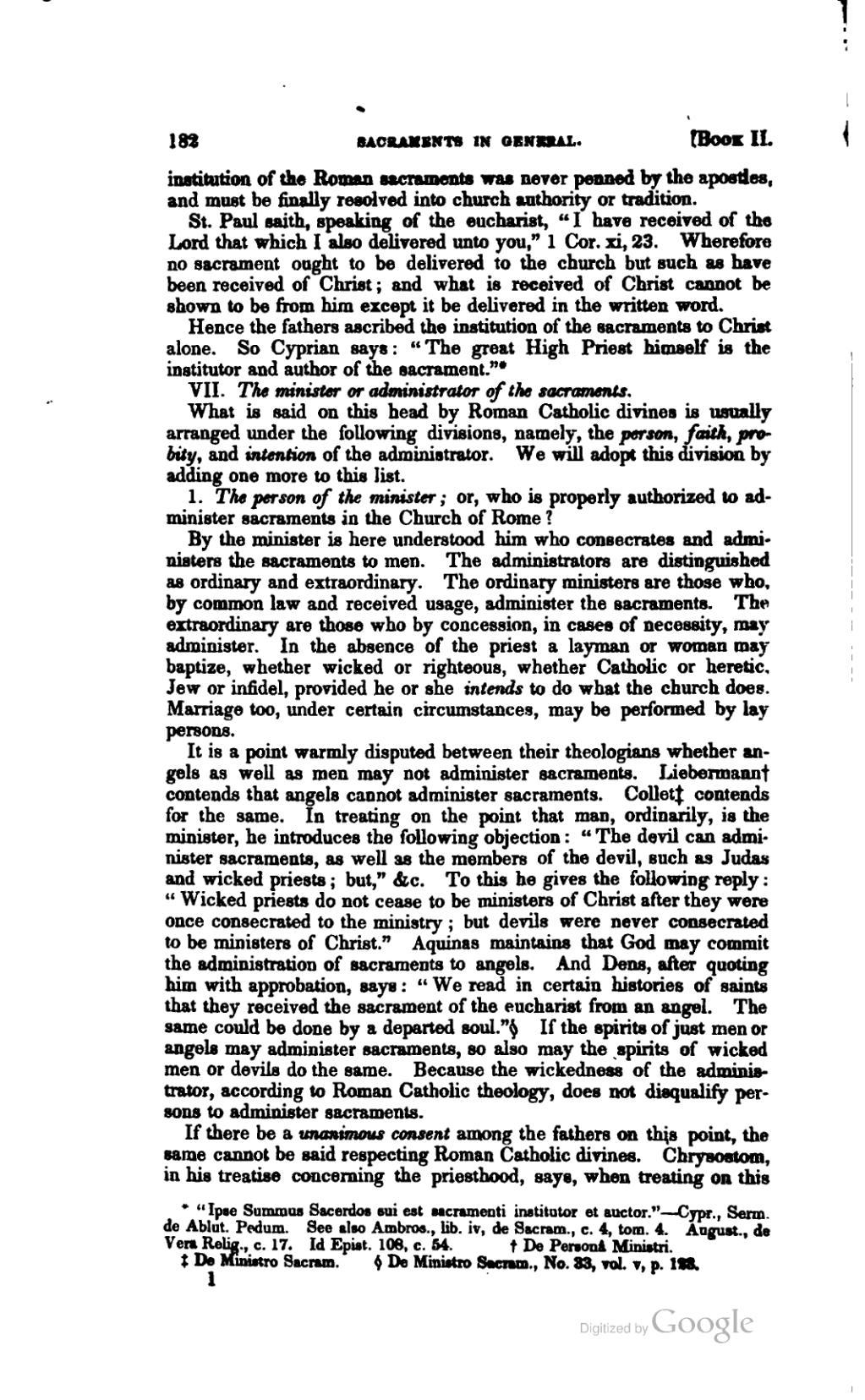18? OAoS,?fSNTS m seNniL. [1JOSE IL ?? eg ?,e ? ? was ?ever ? by ?e apos?ea, and must be fLually, rein)Ired into church authority or tradition. St. Paul as/th, speaking of the euchar/st, "! have received ot? the IJord that which I also delivered unto you," 1 Cot. xi, ?23. ?trherefore no sacrament ought to be delivered to the church but such as have been received of Christ; and what is received of' Christ cnnnot be shown to be from him except it be delivered in the written word. Hence the Fathers ascribed the institution of the sacraments to Christ alone. So Cyprian says: "The great High Priest himself is the institutor and author of the sacrament." VIl. Tb m/n/st? or adm/ni? of t/? What is said on this head by Roman Catholic divines is usmd!y arranged under the following divisious, namely, the/,eras,, fa/t?, ? b/ty, and/ntmt/o? of the administrator. We will adopt this division by adding one more to this list. 1. TI? l?rson of tl? ,,i,,ist?r; or, who is properly authorized to ad- minister sac?rament? in the Church of Rome ? By the minister is here understood him who consecrates and admi- nisters the ?oraments to men. The admin?trators are distinguished as ordinary and extraordinary. The ordinary ministers are those who, by common law and received usage, administer the sacraments. The extraordina.,-y are those who by concession, in cmee of necessity, may administer. In the absence of the priest a layman or woman may baptize, whether wicked or righteous, whether Catholic or heretic. Jew or infidel, provided he or she /ntends to do what the church does. Marriage too, under certain circumstances, may be performed by lay persons. It is a point warmly disputed between their theologians whether gels as well as men may not administer sacraments. Liebermann? contends that angels cannot administer sacraments. Collet s contends for the same. In treating on the point that man, ordinarily, ia the minister, he introduces the following objection: "The devil can admi- mister sacraments, as well as the members of the devfi, such as Judas and wicked priests; but," &c. To thi?_ he gives the following reply: "Wicked priest? do not cease to be ministers of Christ after they were once consecrated to the ministry; but devils were never consecrated ?o be ministers of Christ." AquL?as maintatins that God may commit the adminlstm6on of ?aeraments to angels. And Dems, after quoting him with approbation, asy?: "We read in certaiu histories of sainm that they received the sacrament of the eucharist from an angel. The same could be done by a departed aoul."?) If the epirita of just menor angeis may administer sacraments, so also may the .spirits of wicked men or devils do the same. Because the wickedness of the admini? trator, according to Roman Catholic theology, does not diequalify per- ?ous to administer sacraments. If there be a ? c. on?nt among the fathers on th?s point, the asme cannot be said respecting Roman Catholic divinee. in his treatise concerning the priesthood, saye, when treating on this
- "Ipse Summus Sacerdos eui est ncrmnenti institutor et auctor."--Cypr., Senn.
de Ablut. Pealurn. See also Ambro?., lib. iv, de Sacrum., c. 4, tom. 4. August., de Veto Re?., c. t7. Id Epist. 108, c.M. t De Perscut Ministri. t Do !?mbtro S?crmn. � M'mbtro .Stunurn. , No. 83, vol v, p. 1?18. 1
�
